
Velia was the Roman name of an ancient city of Magna Graecia on the coast of the Tyrrhenian Sea. It was founded by Greeks from Phocaea as Hyele around 538–535 BC. The name later changed to Ele and then Elea before it became known by its current Latin and Italian name during the Roman era. Its ruins are located in the Cilento region near the modern village Velia, which was named after the ancient city. The village is a frazione of the comune Ascea in the Province of Salerno, Campania, Italy.

Pisciotta is an Italian town and comune of the province of Salerno, in the region of Campania.
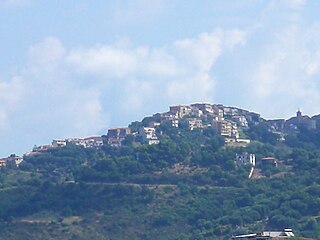
Centola is a town and comune in the province of Salerno in the Campania region of south-western Italy.

Ispani is a town and comune in the province of Salerno in the Campania region of south-western Italy.

Montecorice is a town and comune in the province of Salerno in the Campania region of south-western Italy. As of 2011 its population was of

Pollica is a town and comune in the province of Salerno in the Campania region of south-western Italy. Located 94 km from Salerno, the town rises to an elevation 370 meters from sea level.

Prignano Cilento is a town and comune in the province of Salerno in the Campania region of south-western Italy. As of 2017 its population was of 1,035.
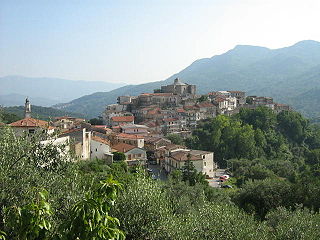
Rofrano is a town and comune of the province of Salerno in the Campania region of south-west Italy. It is located in the southern Cilento. In 2015 its population was 1,539.

Torre Orsaia is a town and comune in the province of Salerno in the Campania region of south-western Italy.

Cape Palinuro is located in southwestern Italy, approximately 50 miles (80 km) southeast of Salerno, in southern part of Cilento region. It is supposedly named after Palinurus, the helmsman of Aeneas' ship in Virgil's Aeneid.
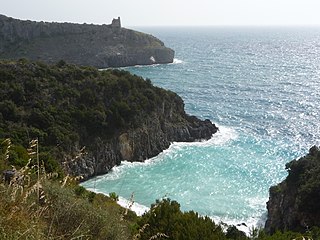
Cilento is an Italian geographical region of Campania in the central and southern part of the Province of Salerno and an important tourist area of southern Italy.
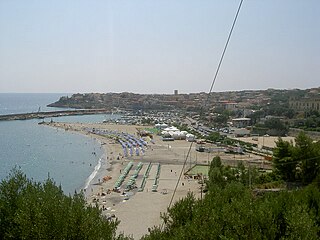
Marina di Camerota is an Italian town, the largest Civil parish (frazione) of Camerota, situated in the province of Salerno, Campania. In 2007 it had a population of 2,674.
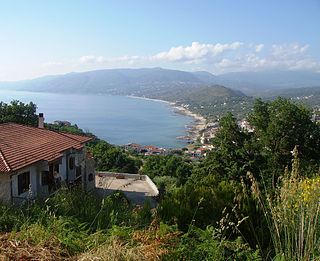
Palinuro is an Italian small town, the most populated civil parish (frazione) of Centola, Province of Salerno, in the Campania region. The name of the town is derived from Palinurus, the helmsman of Aeneas, as recorded in the fifth and sixth books of the Aeneid.

Cilento, Vallo di Diano and Alburni National Park is an Italian national park in the Province of Salerno, in Campania in southern Italy. It includes much of the Cilento, the Vallo di Diano and the Monti Alburni. It was founded in 1991, and was formerly known as the Parco Nazionale del Cilento e Vallo di Diano.

The Cilento Coast is an Italian stretch of coastline in Cilento, on the southern side of the Province of Salerno. It is situated between the gulfs of Salerno and Policastro, extending from the municipalities of Capaccio-Paestum in the north-west, to Sapri in the south-east.

San Severino is an Italian village and hamlet (frazione) of the municipality of Centola in the Province of Salerno, Campania. As of 2011 its population was of 435.

Abatemarco is a southern Italian village and hamlet (frazione) of Montano Antilia, a municipality in the province of Salerno, Campania. in 2011 it had a population of 309.

Massicelle is a southern Italian village and hamlet (frazione) of Montano Antilia, a municipality in the province of Salerno, Campania. in 2011 it had a population of 529.

Casalsottano, also spelled Casal Sottano, is a southern Italian village and hamlet (frazione) of San Mauro Cilento, a municipality in the Province of Salerno, Campania. In 2011 it had a population of 397.

San Marco is a southern Italian village and hamlet (frazione) of Castellabate, a municipality in the province of Salerno, Campania. As of 2009 its population was of 1,139.




















